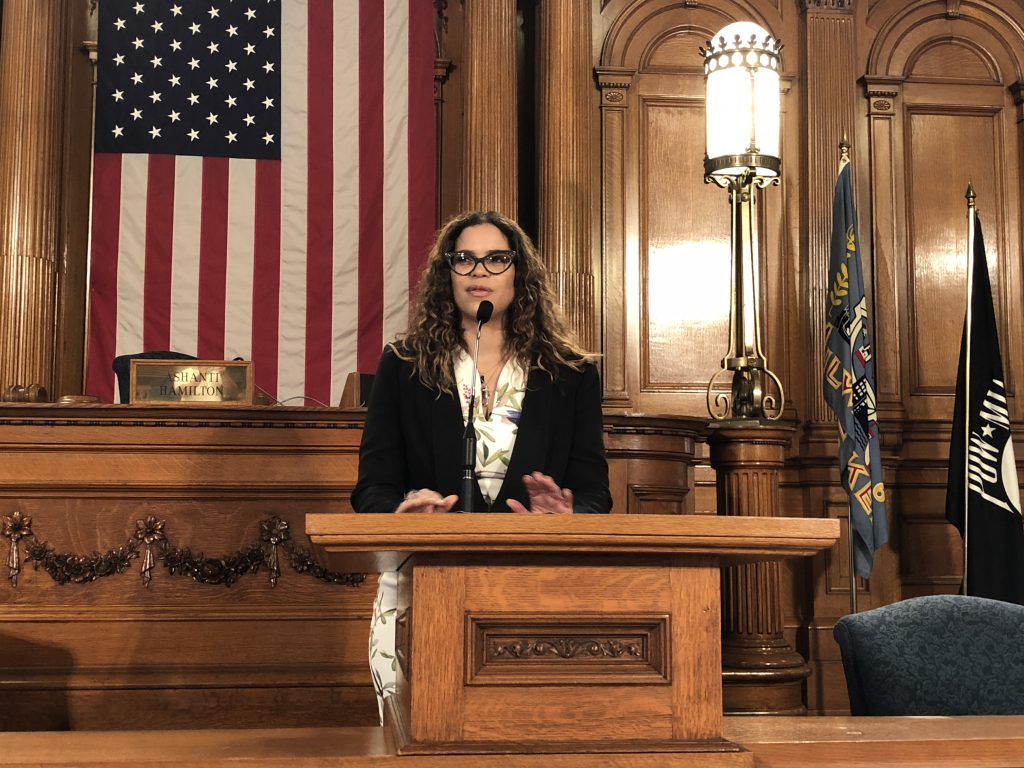Health Commissioner Says She Faced Racism, Sexism
"A constant power struggle from Day One," says outgoing commissioner Jeanette Kowalik.
Milwaukee Health Commissioner Jeanette Kowalik will have served as the city’s top public health official for less than two years when she steps down later this month to take a job as director of policy development for the Trust for America’s Health, a non-profit based in Washington D.C.
In her time as commissioner, she’s seen plenty of challenges.
“I believe that I am limited due to factors that are out of my control,” wrote the commissioner in announcing her resignation on September 2nd. She later clarified that remark was targeted at state officials, including the Wisconsin Supreme Court, that either limited or struck down public health orders. This includes the decision to go ahead as scheduled with an in-person election on April 7th when the city and state were seeing an increasing disease spread and a move to strike down a statewide public health order.
In a new op-ed written for The Daily Beast, she details some of the behind-the-scenes challenges of her job, including threats and passive-aggressive actions.
“As the only Black woman health officer in the state, the luster of being in the role wore off rather quickly. Mostly, I found myself praying that things wouldn’t get any worse,” wrote Kowalik of the situation she inherited in 2018.
Longtime Commissioner Bevan K. Baker resigned in January 2018 at the request of Mayor Tom Barrett after the mayor said he learned of multiple failures of the lead poisoning prevention program. Interim Commissioner Patricia McManus had said she would support a new commissioner, but quickly exited the department after Kowalik was hired. In April 2019, McManus was part of a partnership that publicly attacked Kowalik and Barrett when it didn’t win a federal grant. A group led by McManus had lost the same grant five years prior.
The problems weren’t just outside City Hall.
“It was a constant power struggle from Day One. I was micro-aggressed, man- and ‘Karen’-splained beyond belief, and subject to major passive-aggressive outbursts, and plenty of double standards. I was dragged for having a necessary surgery, as I have several autoimmune conditions. I took two weeks of medical leave to recover while another vital cabinet member took weeks of vacation on multiple occasions and no one questioned him for it,” wrote the commissioner, without identifying the mayoral cabinet member. “Like some other health officials across the country, I received threats of harm mailed to my office prior to COVID-19 and of course after—among them many emails authored by far-right white supremacists.”
“Although the point of striking down the order was to allow locals to do their own thing, many didn’t, for fear of legal issues. Thankfully, my mayor and city attorney supported our ability to keep city-level orders in place, though a unified Milwaukee County order was abandoned,” says Kowalik.
Kowalik credits Milwaukee as a leader in identifying the racial disparities that surround who is contracting the virus, but says the department faced significant challenges in getting people to pay attention. “We faced persistent myths, spread on social media and by word of mouth, that Black people couldn’t get coronavirus. Soon enough, we had valid data that showed this was a lie,” wrote Kowalik. “In the early weeks of our COVID-19 response, 70 percent of our cases and 100 percent of our deaths were Black. My community was angry, afraid, tired. I was, too.”
She said the neighborhood she grew up in, Sherman Park, was the hardest hit early on. “I was horrified to see this, and felt helpless because we couldn’t stop it from happening so quickly. We simply did not have the resources.”
“I still believe being a health officer is a noble endeavor, but even the most seasoned professionals have to admit that our experience with the backlash against common sense and science under this pandemic has been heartbreaking. I truly do not know what the future of the profession will look like as long as experience and formal training in public health is silenced and dismissed,” wrote Kowalik.
The commissioner, during the department’s biweekly conference Thursday, said she doesn’t want to see the virus politicized: “We know there has been a tendency to turn COVID into a political battle… that is totally bogus.”
At the conference, Kowalik also explained she was invited to apply for position in D.C. in July, but was not offered the position formally until after the Common Council had reappointed her on a 14-1 vote.
On Tuesday she said those wearing masks, washing their hands and practicing social distancing are making a difference, even if the data doesn’t show it clearly. “Please continue to do that. We need more to take that work on as our own,” she said. “I just want to appeal to our community that we have all have a responsibility here for reducing the spread of COVID-19.”
Kowalik’s last day with the city is September 22nd. “I’m moving into a national space, so you’ll continue to hear more from me,” said Kowalik on Tuesday.
The Milwaukee Health Department’s second in command, deputy commissioner Sanjib Bhattacharyya, was the other finalist for the health commissioner post in 2018.
If you think stories like this are important, become a member of Urban Milwaukee and help support real, independent journalism. Plus you get some cool added benefits.
Political Contributions Tracker
Displaying political contributions between people mentioned in this story. Learn more.
- March 30, 2016 - Tom Barrett received $100 from Bevan K. Baker
- August 29, 2015 - Tom Barrett received $25 from Bevan K. Baker
























Jeramey, did you talk to Dr. Patricia McManus regarding: “Interim Commissioner Patricia McManus had said she would support a new commissioner, but quickly exited the department after Kowalik was hired.”?
Dr. McManus was ready, willing and offered to help the transition, but Dr. Kowalik never contacted her. Dr. McManus’ exit may have been “quick” but that is because she was ordered to get out. Dr. McManus cares deeply for the Milwaukee Community and she would have made a great Health Commissioner, if only the Mayor would have supported her and empowered her to do her job. You may recall this Press Release https://urbanmilwaukee.com/pressrelease/mayor-barretts-treatment-of-dr-patricia-mcmanus-disgraceful/
And I hope readers will revisit this story to refresh their memories regarding the infant mortality grant. https://myemail.constantcontact.com/Press-Statement-released-by-Milwaukee-African-American-Perinatal-Health-Collaborative–M-A-A-P-H-C—-Dr–Patricia-McManus–Pres.html?soid=1115884303588&aid=KAfgI8f3R1Y
Dr. Patricia McManus is an Honorable Women deserving of our Respect and Admiration.
Ms. Kowalik,
Did it ever occur to you that they simply just didn’t like you?
Anyway, I’m guessing the atmosphere in Washington DC will be calm, smooth, evenhanded, with everything based on merit. It’s the nature of the place, of course. Having worked there for a short time myself in a federal agency, it was just ideal — unless one actually was endeavoring to DO something.
Maybe it will be better than I remember it.